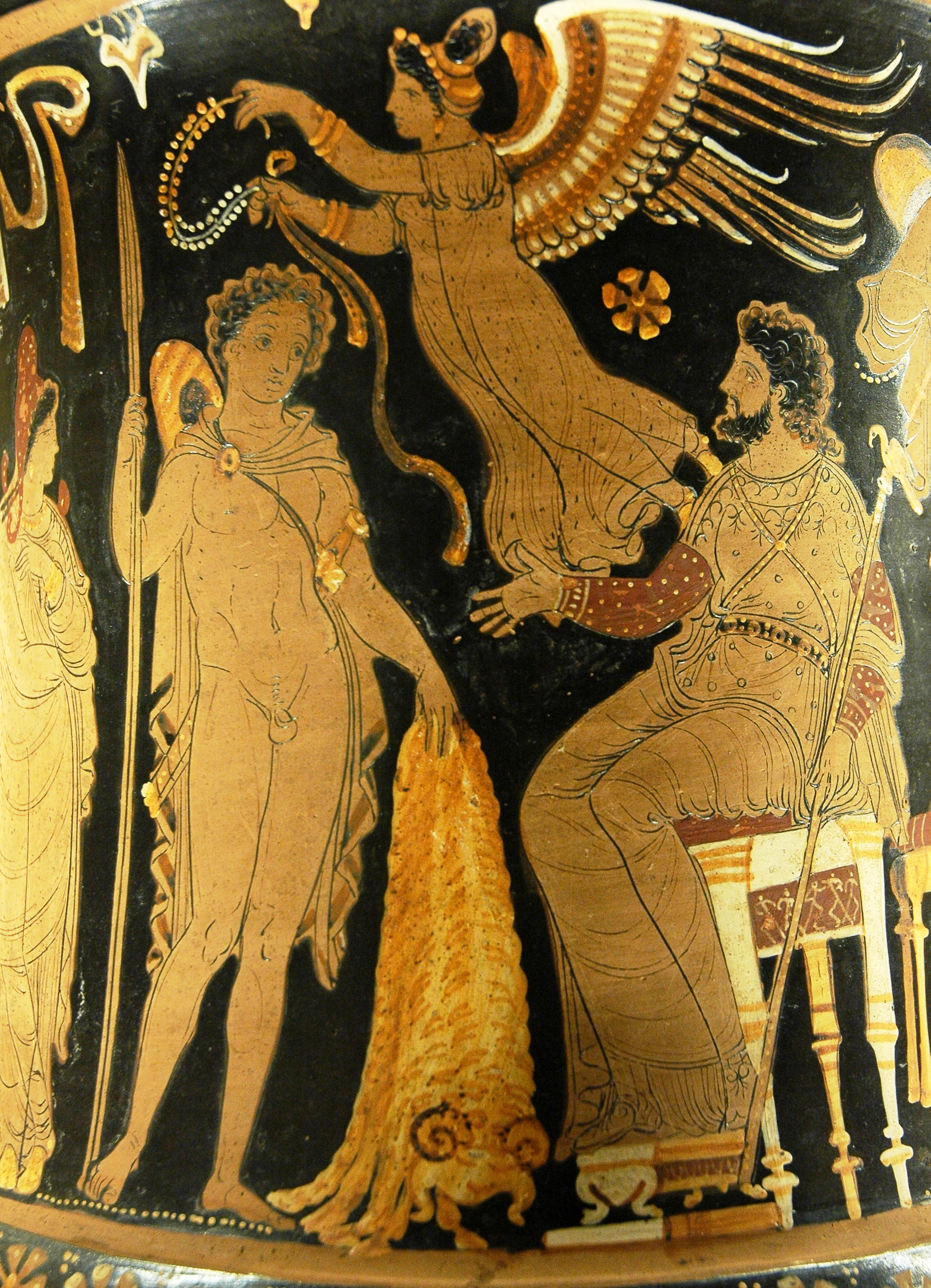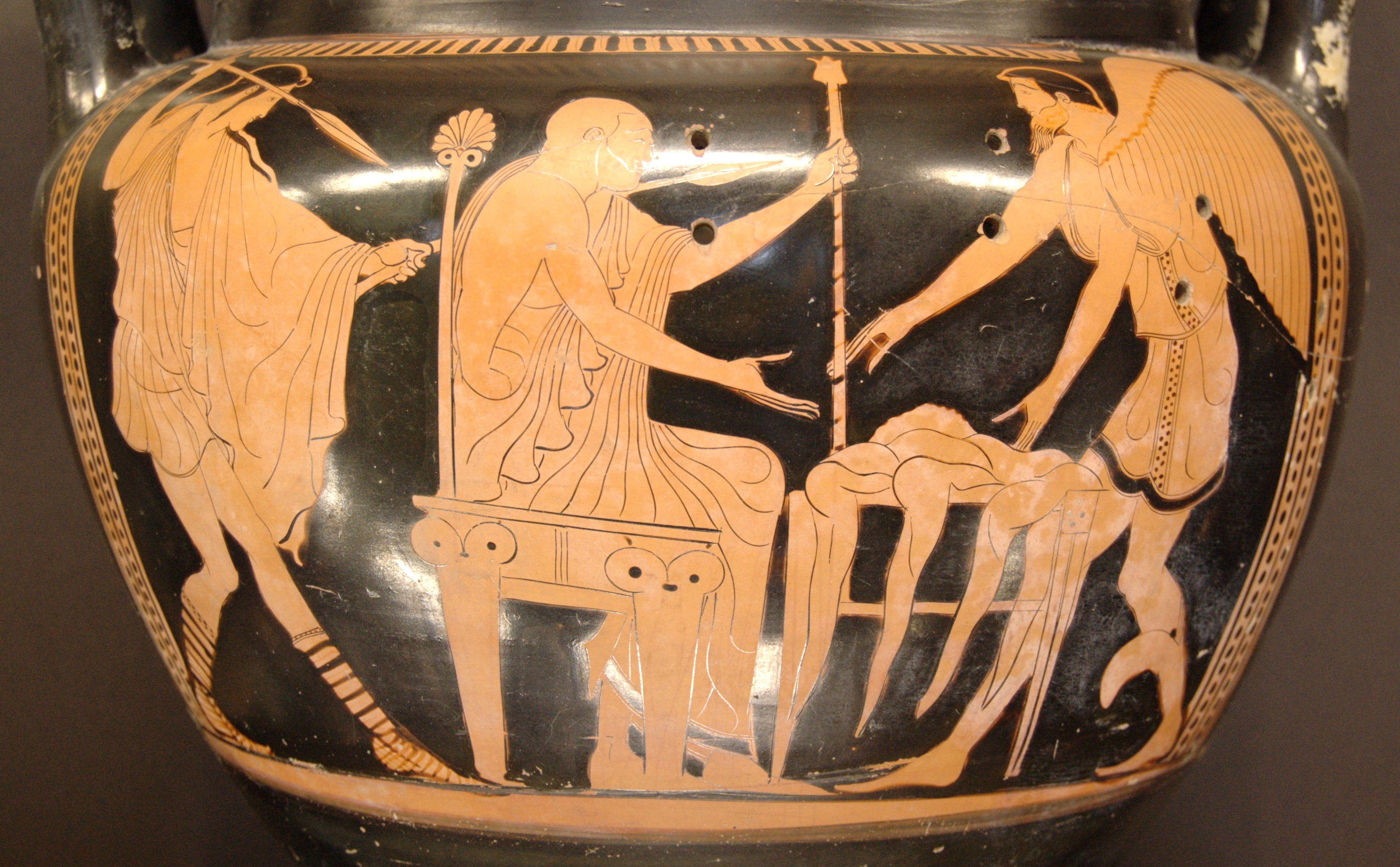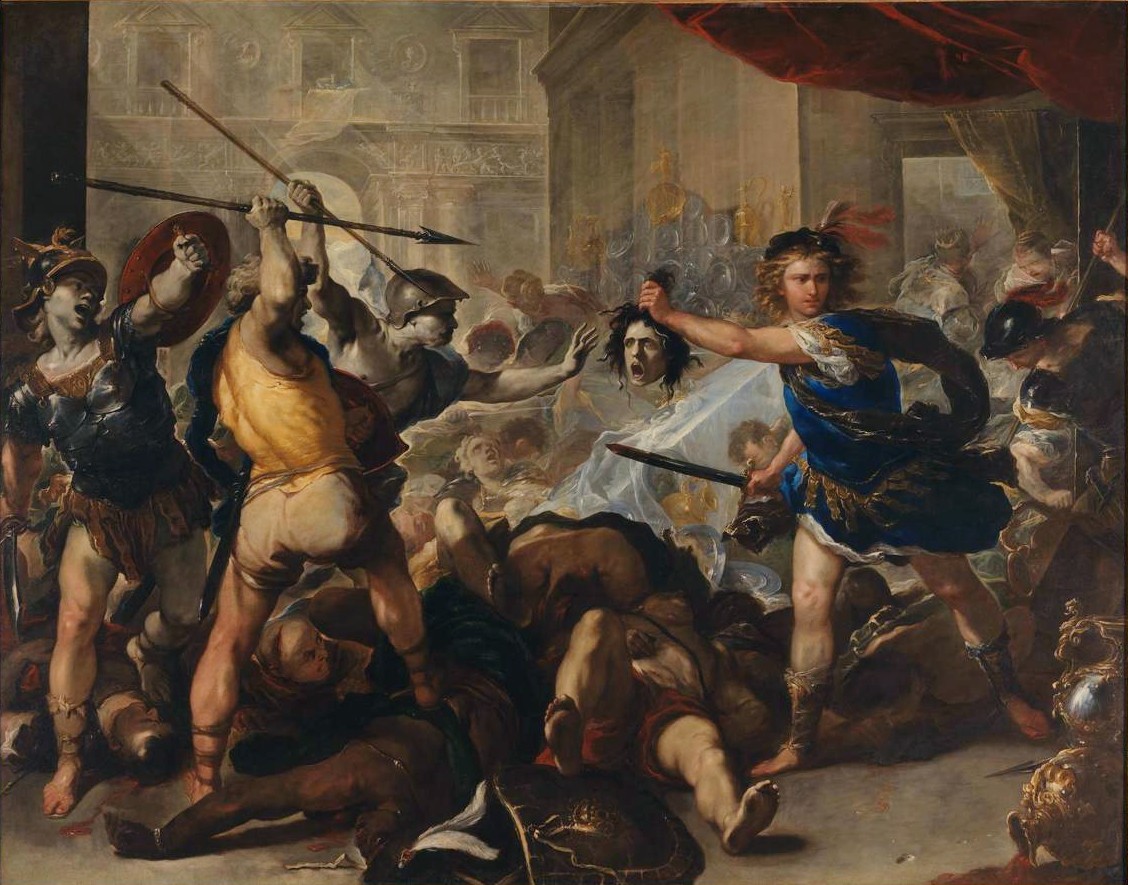|
Phineus (mythology)
In Greek mythology, Phineus (; grc-gre, Φινεύς, ) was the name of the following figures: * Phineus, an Arcadian prince as one of the 50 sons of the impious King Lycaon either by the naiad Cyllene, Nonacris or by unknown woman. He and his brothers were the most nefarious and carefree of all people. To test them, Zeus visited them in the form of a peasant. These brothers mixed the entrails of a child into the god's meal, whereupon the enraged Zeus threw the meal over the table. Aegaeon was killed, along with his brothers and their father, by a lightning bolt of the god. *Phineus (son of Belus), who was turned to stone by Perseus.Apollodorus2.1.4/ref> *Phineus, king of Thrace who was visited by Jason and the Argonauts.Apollodorus1.9.21/ref> See also *Phineus (other) *Phineas (other) *Phinehas (other) Notes References * Apollodorus, ''The Library'' with an English Translation by Sir James George Frazer, F.B.A., F.R.S. in 2 Volumes, Cambridge, ... [...More Info...] [...Related Items...] OR: [Wikipedia] [Google] [Baidu] |
Greek Mythology
A major branch of classical mythology, Greek mythology is the body of myths originally told by the Ancient Greece, ancient Greeks, and a genre of Ancient Greek folklore. These stories concern the Cosmogony, origin and Cosmology#Metaphysical cosmology, nature of the world, the lives and activities of List of Greek mythological figures, deities, Greek hero cult, heroes, and List of Greek mythological creatures, mythological creatures, and the origins and significance of the ancient Greeks' own cult (religious practice), cult and ritual practices. Modern scholars study the myths to shed light on the religious and political institutions of ancient Greece, and to better understand the nature of myth-making itself. The Greek myths were initially propagated in an oral tradition, oral-poetic tradition most likely by Minoan civilization, Minoan and Mycenaean Greece, Mycenaean singers starting in the 18th century BC; eventually the myths of the heroes of the Trojan War and its after ... [...More Info...] [...Related Items...] OR: [Wikipedia] [Google] [Baidu] |
Perseus
In Greek mythology, Perseus (Help:IPA/English, /ˈpɜːrsiəs, -sjuːs/; Greek language, Greek: Περσεύς, Romanization of Greek, translit. Perseús) is the legendary founder of Mycenae and of the Perseid dynasty. He was, alongside Cadmus and Bellerophon, the greatest Greek hero and slayer of monsters before the days of Heracles. He beheaded the Gorgon Medusa for Polydectes and saved Andromeda (mythology), Andromeda from the sea monster Cetus (mythology), Cetus. He was the son of Zeus and the mortal Danaë, as well as the half-brother and great-grandfather of Heracles (as they were both children of Zeus, and Heracles' mother was descended from Perseus). Etymology Because of the obscurity of the name "Perseus" and the legendary character of its bearer, most etymologists presume that it might be pre-Greek; however, the name of Perseus's native city was Greek and so were the names of his wife and relatives. There is some idea that it descended into Greek from the Proto-Indo-Eu ... [...More Info...] [...Related Items...] OR: [Wikipedia] [Google] [Baidu] |
Princes In Greek Mythology
A prince is a Monarch, male ruler (ranked below a king, grand prince, and grand duke) or a male member of a monarch's or former monarch's family. ''Prince'' is also a title of nobility (often highest), often hereditary title, hereditary, in some European State (polity), states. The female equivalent is a princess. The English language, English word derives, via the French language, French word ''prince'', from the Latin noun , from (first) and (head), meaning "the first, foremost, the chief, most distinguished, noble monarch, ruler, prince". Historical background The Latin word (older Latin *prīsmo-kaps, literally "the one who takes the first [place/position]"), became the usual title of the informal leader of the Roman senate some centuries before the transition to Roman Empire, empire, the ''princeps senatus''. Emperor Augustus established the formal position of monarch on the basis of principate, not Dominate, dominion. He also tasked his grandsons as summer rulers o ... [...More Info...] [...Related Items...] OR: [Wikipedia] [Google] [Baidu] |
Sons Of Lycaon
A son is a male offspring; a boy or a man in relation to his parents. The female counterpart is a daughter. From a biological perspective, a son constitutes a first degree relative. Social issues In pre-industrial societies and some current countries with agriculture-based economies, a higher value was, and still is, assigned to sons rather than daughters, giving males higher social status, because males were physically stronger, and could perform farming tasks more effectively. In China, a one-child policy was in effect until 2015 in order to address rapid population growth. Official birth records showed a rise in the level of male births since the policy was brought into law. This was attributed to a number of factors, including the illegal practice of sex-selective abortion and widespread under-reporting of female births. In patrilineal societies, sons will customarily inherit an estate before daughters. In some cultures, the eldest son has special privileges. For examp ... [...More Info...] [...Related Items...] OR: [Wikipedia] [Google] [Baidu] |
Phinehas (other)
Phinehas was son of Eleazar and grandson of Aaron the High Priest. Phinehas, Pinhas, or Pinchas may also refer to: People *Hophni and Phinehas, two sons of the High Priest Eli, a priest at Shiloh who died when the Philistines captured the Ark of the Covenant * Phinehas ben Jair, early Jewish rabbi of the 2nd century *Pinkhos Churgin (1894-1957), first President of Bar-Ilan University *Pinhas Gershon, Israeli basketball coach * Pinhas Hozez (born 1957), Israeli basketball player * Pinchas Lapide (1922-1997), Jewish theologian and Israeli historian * Pinchas Sadeh (1929–1994), Polish-born Israeli novelist and poet *Pinchas Sapir (1906–1975), Israeli politician *Pinchas Zukerman (born 1948), Israeli violinist, violist, and conductor Other *Pinechas (parsha), the 41st weekly Torah portion *Phineas Priesthood, a Christian Identity movement *Phinehas (band), a band from La Mirada, California * Phinehas (EP), an EP by the band of the same name See also * Phineas (other) ... [...More Info...] [...Related Items...] OR: [Wikipedia] [Google] [Baidu] |
Phineas (other)
Phineas () is a masculine given name. Notable people with the name include: * Phineas, an Anglicized name for the priest Phinehas in the Hebrew Bible * King Phineas, the first king of the Beta Israel in Ethiopia * Phineas Banning (1830–1885), American businessman and entrepreneur * P. T. Barnum (1810–1891), American showman and businessman * Phineas Bowles (died 1722), British Army major-general * Phineas Bowles (1690–1749), British Army lieutenant-general and Member of Parliament; son of the above * Phineas F. Bresee (1838–1915), American founder of the Church of the Nazarene * Phineas Bruce (1762–1809), American politician * Phineas Clanton (1843–1906), American Old West cattle rustler and brother of outlaws Billy and Ike Clanton * Phineas Davis (1792–1835), American clockmaker and inventor who designed and built the first practical American coal-burning locomotive * Phineas Fisher, an unidentified hacktivist * Phineas Fletcher (1582–1650), Scottish-English poet * ... [...More Info...] [...Related Items...] OR: [Wikipedia] [Google] [Baidu] |
Phineus (other)
{{disambiguation ...
Phineus is a Greek mythological king of Thrace, visited by Jason and the Argonauts. Phineus may also refer to: * Phineus (son of Belus), turned to stone by Perseus * Phineus, one of the sons of Lycaon, king of Arcadia * '' Phineus (insect)'' a genus of shield bugs in the subfamily Discocephalinae See also * Phineus (mythology) *Phineas (other) *Phinehas (other) Phinehas was son of Eleazar and grandson of Aaron the High Priest. Phinehas, Pinhas, or Pinchas may also refer to: People *Hophni and Phinehas, two sons of the High Priest Eli, a priest at Shiloh who died when the Philistines captured the Ark of ... [...More Info...] [...Related Items...] OR: [Wikipedia] [Google] [Baidu] |
Argonauts
The Argonauts (; Ancient Greek: ) were a band of heroes in Greek mythology, who in the years before the Trojan War (around 1300 BC) accompanied Jason to Colchis in his quest to find the Golden Fleece. Their name comes from their ship, '' Argo'', named after its builder, Argus. They were sometimes called Minyans, after a prehistoric tribe in the area. Mythology The Golden Fleece After the death of King Cretheus, the Aeolian Pelias usurped the throne from his half-brother Aeson and became king of Iolcus in Thessaly (near the modern city of Volos). Because of this unlawful act, an oracle warned him that a descendant of Aeolus would seek revenge. Pelias put to death every prominent descendant of Aeolus he could, but spared Aeson because of the pleas of their mother Tyro. Instead, Pelias kept Aeson prisoner and forced him to renounce his inheritance. Aeson married Alcimede, who bore him a son named Jason. Pelias intended to kill the baby at once, but Alcimede summoned her kinswome ... [...More Info...] [...Related Items...] OR: [Wikipedia] [Google] [Baidu] |
Jason
Jason ( ; ) was an ancient Greek mythological hero and leader of the Argonauts, whose quest for the Golden Fleece featured in Greek literature. He was the son of Aeson, the rightful king of Iolcos. He was married to the sorceress Medea. He was also the great-grandson of the messenger god Hermes, through his mother's side. Jason appeared in various literary works in the classical world of Greece and Rome, including the epic poem ''Argonautica'' and the tragedy ''Medea''. In the modern world, Jason has emerged as a character in various adaptations of his myths, such as the 1963 film '' Jason and the Argonauts'' and the 2000 TV miniseries of the same name. Persecution by Pelias Pelias (Aeson's half-brother) was power-hungry and sought to gain dominion over all of Thessaly. Pelias was the progeny of a union between their shared mother, Tyro ("high born Tyro"), the daughter of Salmoneus, and the sea god Poseidon. In a bitter feud, he overthrew Aeson (the rightful king), kill ... [...More Info...] [...Related Items...] OR: [Wikipedia] [Google] [Baidu] |
Thrace
Thrace (; el, Θράκη, Thráki; bg, Тракия, Trakiya; tr, Trakya) or Thrake is a geographical and historical region in Southeast Europe, now split among Bulgaria, Greece, and Turkey, which is bounded by the Balkan Mountains to the north, the Aegean Sea to the south, and the Black Sea to the east. It comprises southeastern Bulgaria (Northern Thrace), northeastern Greece (Western Thrace), and the European part of Turkey ( East Thrace). The region's boundaries are based on that of the Roman Province of Thrace; the lands inhabited by the ancient Thracians extended in the north to modern-day Northern Bulgaria and Romania and to the west into the region of Macedonia. Etymology The word ''Thrace'' was first used by the Greeks when referring to the Thracian tribes, from ancient Greek Thrake (Θρᾴκη), descending from ''Thrāix'' (Θρᾷξ). It referred originally to the Thracians, an ancient people inhabiting Southeast Europe. The name ''Europe'' first referred to ... [...More Info...] [...Related Items...] OR: [Wikipedia] [Google] [Baidu] |
Phineus
In Greek mythology, Phineus (; Ancient Greek: Φινεύς, ) or Phineas, was a king of Salmydessus in Thrace and seer, who appears in accounts of the Argonauts' voyage. Some accounts make him a king in PaphlagoniaScholia on Apollonius of Rhodes, 2.178, 237; Scholia ''ad eund'' 2.177; Eustathius ad Homer, ''Iliad'2.851 ad Dionysius Periegetes, 787; Stephanus of Byzantium, s.v.; Constantine Porphyrogennetos, ''De thematibus'' 1.7; William Smith, ''Dictionary of Greek and Roman Geography'' s.v. Paphlagonia' or in Arcadia. Family Several different versions of Phineus's parentage were presented in ancient texts. According to Apollonius of Rhodes, he was a son of Agenor, but the '' Bibliotheca'' says that other authors named his father as Poseidon (who is the father of Agenor).Apollodorus1.9.21/ref> The Hesiodic ''Catalogue of Women'', on the other hand, reported that Phineus was the son of Phoenix and Cassiopeia. His first wife was Cleopatra, daughter of Boreas and Oreithyia, ... [...More Info...] [...Related Items...] OR: [Wikipedia] [Google] [Baidu] |
Phineus (son Of Belus)
In Greek mythology, Phineus ( /ˈfɪniəs, ˈfɪn.juːs/; Ancient Greek: Φινεύς, ) was a son of Belus by Anchinoe and thus brother to Aegyptus, Danaus and Cepheus. Mythology Phineus had been engaged to Cepheus' daughter Andromeda before she wed Perseus, and Phineus plotted against him, leading Perseus to turn him and his co-conspirators into stone by showing them the head of Medusa. The affair appears to have formed part of Euripides' lost '' Andromeda'', but the sole extensive ancient treatment is found Ovid's ''Metamorphoses''. In Ovid's account Perseus asked for Andromeda's hand in return for saving the girl from the sea-monster Cetus to whom an oracle had ordained Andromeda be sacrificed as punishment for her mother Cassiopeia's boast that she was more beautiful than the Nereids. Perseus was successful, but as he recounted his deeds to the court of Cepheus a spear-brandishing Phineus assailed him: Phineus' presumed motive in marrying Andromeda was to strengthen ... [...More Info...] [...Related Items...] OR: [Wikipedia] [Google] [Baidu] |








